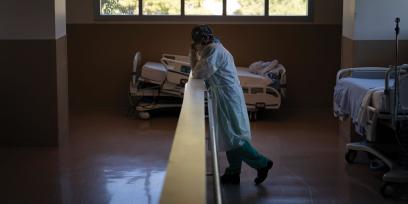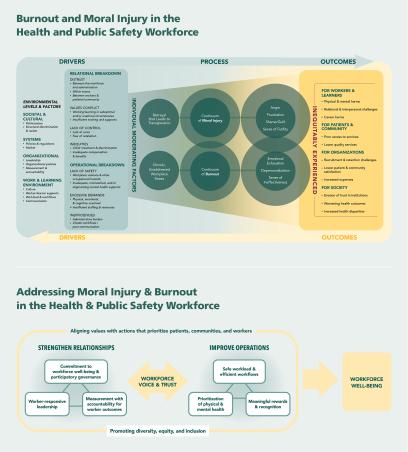The COVID-19 pandemic placed incredible strain on the health and public safety workforce. The nature of their work meant that they faced high risk of exposure while being called on to meet tremendous healthcare and service demands. Even before the pandemic, mental health, burnout, and moral injury were rising issues for this workforce. But during COVID-19, more than 50 percent of health workers reported burnout, and 40 percent reported anxiety or depression. Though the critical period of the COVID-19 pandemic may be waning, burnout and moral injury among health and public safety workers persist.
The Workplace Change Collaborative (WCC) recently released the National Framework for Addressing Burnout and Moral Injury in the Health and Public Safety Workforce, which explores the drivers and processes of burnout and moral injury and identifies practical strategies and tools to improve worker and learner well-being in health and public safety settings. The framework emphasizes organization- and system-level changes in recognition that threats to personal and professional well-being originate in or are compounded by upstream drivers.
To explore an interactive version of the framework, go to wpchange.org. For actionable strategies for a wide range of stakeholders, see wpchange.org/actionable-strategies. If you’d like details on how we developed this framework, see our report at go.aft.org/x5v. Here, we share graphics that summarize the key factors that drive burnout and moral injury and how to improve the well-being of the health and public safety workforce.
As a healthcare professional, you have likely experienced the complex and intersecting factors that produce burnout and moral injury firsthand. Overarching environmental factors—from politicization and racism to unmanageable workloads—contribute to relational and operational breakdown. Relational breakdown refers to the distrust, conflicting values, lack of control, and inequities experienced in work and learning environments. Operational breakdown is seen in a lack of physical and mental health safety, excessive work demands, and inefficiencies. Often, interventions have focused on operational breakdown; however, burnout and moral injury will not be fully addressed without repairing distrust and other relational challenges. We hope this framework helps you, your union, and your employer rebuild relationships and trust, solve operational problems, and restore workers’ well-being.
The Workplace Change Collaborative is a partnership between the Fitzhugh Mullan Institute for Health Workforce Equity at George Washington University, the Institute for Healthcare Improvement, Moral Injury of Healthcare, and AFT Healthcare.
[Photo: AP Photo / Jae C. Hong, File


